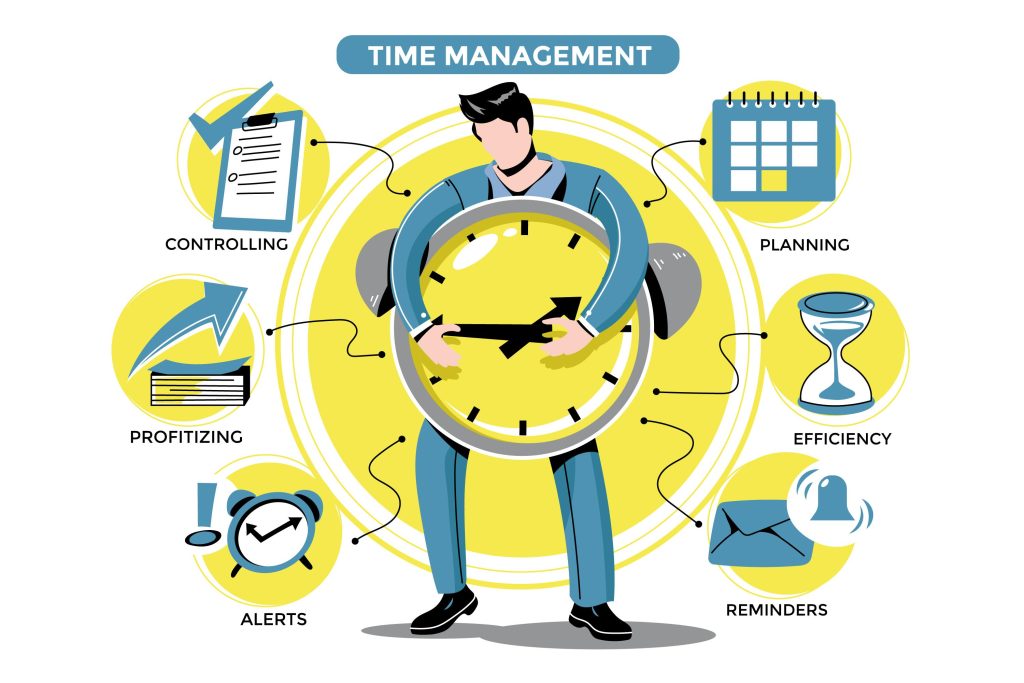In today’s fast-paced world, mastering effective time management strategies is crucial for anyone looking to juggle multiple responsibilities, whether at work, school, or home. With the rise of remote work and the need to balance various projects, effective time management can help enhance productivity, reduce stress, and lead to a more fulfilling life. This article explores practical strategies to help you manage your time efficiently while handling various tasks.

Why Time Management Matters
Understanding the importance of time management is the first step toward mastering it. Poor time management can result in:
- Increased Stress: When tasks accumulate, feelings of overwhelm and anxiety can increase.
- Missed Deadlines: Ineffective planning often leads to incomplete tasks and late submissions, which can harm your reputation.
- Decreased Productivity: Disorganization can result in wasted time and decreased focus, ultimately lowering your performance.
Research by the American Psychological Association shows that effective time management improves job performance and contributes to better mental health (source: APA). By implementing effective time management strategies, you can unlock your potential and maintain a more balanced lifestyle.
Key Strategies for Effective Time Management
1. Prioritize Your Tasks
One of the essential aspects of effective time management is prioritization. Not all tasks carry equal weight, and knowing which ones to tackle first can streamline your workflow.
- Eisenhower Matrix: This tool allows you to categorize tasks based on urgency and importance. Focus on tasks that are both urgent and important first, and then tackle those that are important but not urgent.
2. Set Clear Goals
Establishing clear, actionable goals directs your time management efforts effectively. Consider using the SMART criteria—Specific, Measurable, Achievable, Relevant, and Time-bound.
- Example: Instead of saying, “I want to work more,” set a goal like, “I will complete 500 words daily for the next week.”
3. Create a Structured Schedule
A well-organized schedule can be your most valuable ally when managing multiple projects.
- Time Blocking: Allocate specific blocks of time for different tasks or projects. Dedicating uninterrupted time to each project enhances focus and productivity.
4. Leverage Technology
Several tools can help streamline your time management efforts, making it easier to juggle multiple responsibilities.
- Trello: A visual project management tool that helps you organize tasks and track progress.
- Todoist: An app for creating to-do lists and setting deadlines.
- Pomodoro Technique Apps: Tools like Focus Booster allow you to work in intervals, enhancing focus while preventing burnout.
5. Limit Distractions
Distractions can severely disrupt your productivity. Identifying and reducing distractions is vital for maintaining focus.
- Digital Detox: Limit your use of social media and other distractions during focused work periods.
- Create a Conducive Workspace: An organized and clutter-free workspace can significantly enhance concentration and motivation.
The Importance of Flexibility
While having a structured plan is essential, being flexible is equally important. Life is unpredictable, and unexpected events can disrupt your schedule.
- Regularly Review Your Goals: Assess your progress weekly to adjust your plans based on what’s working and what’s not.
Maintain Work-Life Balance
Juggling multiple projects can lead to neglecting personal time. It’s vital to maintain a healthy work-life balance to prevent burnout.
- Schedule Breaks: Incorporate short breaks into your day to recharge. Techniques like the Pomodoro Technique recommend working for 25 minutes, followed by a 5-minute break.
- Engage in Hobbies: Set aside time for activities outside of work to foster creativity and relaxation.
Measuring Your Success
Once you’ve implemented these strategies, measuring your success is crucial. Reflecting on your progress allows for adjustments as needed.
- Track Your Time: Use tools like RescueTime to analyze how you spend your time and identify areas for improvement.
- Feedback Loop: Regularly seek feedback from peers or mentors on your productivity and time management skills.
Conclusion
Mastering effective time management strategies can lead to increased productivity and reduced stress. By prioritizing tasks, setting clear goals, leveraging technology, and maintaining flexibility, you can create a balanced approach to managing your time. Remember, effective time management is about working smarter, not harder.
As you refine your skills, you’ll find that juggling multiple responsibilities becomes more manageable and less overwhelming. Implementing these strategies will empower you to take control of your time and lead a more fulfilling life, both professionally and personally.
References
- American Psychological Association. “The Role of Time Management in Academic Success.” APA
- Covey, Stephen R. The 7 Habits of Highly Effective People. Free Press, 1989. Amazon
- Allen, David. Getting Things Done: The Art of Stress-Free Productivity. Penguin Books, 2001. Amazon
- Drucker, Peter F. The Effective Executive: The Definitive Guide to Getting the Right Things Done. HarperBusiness, 1967. Amazon
- Lakein, Alan. How to Get Control of Your Time and Your Life. Penguin Books, 1973. Amazon









